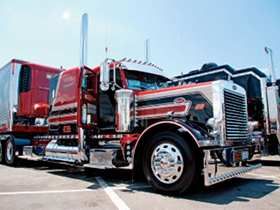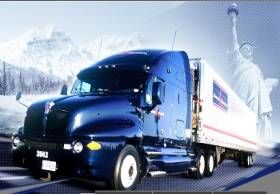World's First Self-driving Truck
Topic 8508 | Page 1
For starters, I completely agree with Old School. This isn't happening anytime soon, possibly not in our lifetime. We had the ability to use self-flying airplanes decades ago. Nowadays most of the time the plane is on autopilot and the pilots could be eliminated entirely but it isn't happening. There are still two pilots in every plane. And believe it or not, having an airplane fly itself in the real world is a thousand times easier to pull off than having a vehicle drive itself in the real world. If they're not doing it yet in airplanes they won't be doing it anytime soon in vehicles.
The only way self driving cars or trucks would work safely is if every single vehicle on the road was automated and connected to the same system. Think about how dangerous that would be to have both humans controlled and automated vehicles on the same road, especially an 80,000 lb. truck. Computers can't calculate every single driving scenario, and they won't be able to take into account the randomness of our world. Murphy's law. If something can go wrong it will...
Excellent point and I also agree with this completely. To slowly and incrementally transition from what we have now to fully automated driving seems like a ridiculous way to attempt it. To me it seems far more logical to build a "self-driving lane" on highways that do not interact with human-driven vehicles. But even then, what do you do in cities? How do you cover "the last mile" from the highway to the customer in Downtown Chicago? Good luck with that.
Drivers are not going to be eliminated anytime soon and I dare say it may not happen in my lifetime, which I expect to last at least another 50 years. The complexities go far beyond technological hurdles. Public perception is going to be even more difficult to overcome than the technology. On top of that, you're going to have a long line of very rich, powerful companies and individuals who do not want to see the current system being eliminated because that's how they're making their money. So you're going to have to overcome the technological hurdles, the public perception, and the (almost) infinitely wealthy and powerful status quo to make it happen. Good luck with that!
The thing is that computers fail
Yeah, but people never do. They're totally reliable 24/7/365, right? They don't get distracted or overly aggressive or make bad decisions, right? Let me tell ya......if I had to choose between relying on a computer or relying on a person there wouldn't be any hesitation as to which I would trust more - computers.
Like I said before, I don't see this becoming a danger for my job in my lifetime. There's just too many details to work out if this is going to be the future
That could have been said for automobiles or airplanes in the early 20th century. In 1910 we could barely get a paper airplane off the ground. Thirty years later we're testing rockets and preparing to put satellites in orbit.
I'm not sure if it's still there, but there was an old truck from the 40's on display in a truck stop in Nebraska. Along with the truck was the original letter, typed by the owner of the truck addressed to the owner of the dealership he purchased it from. It said (to paraphrase):
"I just wanted to tell you how much this truck has helped us. It used to take a team of three horses three days to haul one load of hay to town. Now I can make three trips in one day with my truck."
It was WWII era and people were still replacing horses with trucks.
One final note. The original Space Shuttle, designed in the 50's and 60's and built in the 70's had less computer power originally than an iPhone does today. Things we consider to be science fiction or "Star Trek technology" now will be considered boring or will be in everyone's pocket 20 years from now.
One thing people fail to realize is how much technology we have available that isn't being used because either they can't figure out how to make it economically feasible or someone is holding key patents and won't allow it to be used. It's not about what we're capable of. Technologically speaking we're plenty capable of using drones or automated trucks in our everyday lives. But for every new technology that comes along there are untold numbers of people and corporations whose livelihood and existence rely on the current technologies which would be replaced. They'll simply find ways to stop the use of newer technologies. It's been happening since the beginning of time.
So I agree that a lot of this may not play out in our lifetimes but it certainly isn't because we're not capable of producing the technology. Don't kid yourself. That's not the problem. The problem is making it economically feasible and wrestling control away from the current powerhouses that stand to lose everything if they don't block the new technologies.
HOS:
Hours Of Service
HOS refers to the logbook hours of service regulations.OOS:
When a violation by either a driver or company is confirmed, an out-of-service order removes either the driver or the vehicle from the roadway until the violation is corrected.

Looks like I'm getting in the game just in time
Eliminating the driver is so far away that I just don't see this gaining any traction in the industry in any of our lifetimes. This is still a long way from eliminating the driver. It may be used to help drivers get some rest in our lifetime, but man what a mess that is going to make for the folks who come up with these ridiculous regulations we have to deal with.
I find it fascinating, but totally impractical for the industry, at least as far as the way logistics is done now.

So it’s no surprise some of the country’s largest freight carriers have in recent years started equipping their vehicles with active safety features like lane control and automatic braking. The economic case for these measures—the predecessors to fuller autonomy—is clear, says Noël Perry, an economist who specializes in transportation and logistics.
... and if you have driven one with these devices (I have - a bunch) you know what a pile of junk they are and how annoying that "Uhhh" sound is every time you cross a lane line (whether it's really one or just a crack with tar to fill it in) ... or had the damn truck decelerate just before you are ready to pull to the left lane to pass a slower truck OR had the damn thing slam on the brakes because it sees a bridge abutment on a curve and thinks it is a stationary object in the road ... there is NO WAY these "safety devices" are safer than a driver who is doing his job ... it's a huge lawsuit waiting to happen when an "autonomous" truck kills a family in a mini-van - and it WILL happen ...
Jopa



The only way self driving cars or trucks would work safely is if every single vehicle on the road was automated and connected to the same system. Think about how dangerous that would be to have both humans controlled and automated vehicles on the same road, especially an 80,000 lb. truck. Computers can't calculate every single driving scenario, and they won't be able to take into account the randomness of our world. Murphy's law. If something can go wrong it will...

My concern with this is that the first stage will be a sort of auto pilot mode for freeway driving where the driver will have to be in the seat and ready to take back the wheel in the event that the computer fails or encounters a situation it can't handle. The part that worries me is some drivers will run late night and go to sleep instead of sitting in the driver seat. I bet after weeks of no issues a driver may be tempted to take a nap and then when the computer has a problem the driver won't be ready to take over.
For starters, I completely agree with Old School. This isn't happening anytime soon, possibly not in our lifetime. We had the ability to use self-flying airplanes decades ago. Nowadays most of the time the plane is on autopilot and the pilots could be eliminated entirely but it isn't happening. There are still two pilots in every plane. And believe it or not, having an airplane fly itself in the real world is a thousand times easier to pull off than having a vehicle drive itself in the real world. If they're not doing it yet in airplanes they won't be doing it anytime soon in vehicles.
The only way self driving cars or trucks would work safely is if every single vehicle on the road was automated and connected to the same system. Think about how dangerous that would be to have both humans controlled and automated vehicles on the same road, especially an 80,000 lb. truck. Computers can't calculate every single driving scenario, and they won't be able to take into account the randomness of our world. Murphy's law. If something can go wrong it will...
Excellent point and I also agree with this completely. To slowly and incrementally transition from what we have now to fully automated driving seems like a ridiculous way to attempt it. To me it seems far more logical to build a "self-driving lane" on highways that do not interact with human-driven vehicles. But even then, what do you do in cities? How do you cover "the last mile" from the highway to the customer in Downtown Chicago? Good luck with that.
Drivers are not going to be eliminated anytime soon and I dare say it may not happen in my lifetime, which I expect to last at least another 50 years. The complexities go far beyond technological hurdles. Public perception is going to be even more difficult to overcome than the technology. On top of that, you're going to have a long line of very rich, powerful companies and individuals who do not want to see the current system being eliminated because that's how they're making their money. So you're going to have to overcome the technological hurdles, the public perception, and the (almost) infinitely wealthy and powerful status quo to make it happen. Good luck with that!

Autonomous Google cars have been driving around California for years already with, I believe, only one minor fender bender. The latest Tesla software update has this built in as well. Agree that it is a long time coming for trucks though. For open stretches of highway maybe but a crowded city street and a tough dock would probably cause the computer to explode. :)

When the truck can start "autonomously" delivering the boxes at each stop then I'll start to worry.
When the truck can start "autonomously" delivering the boxes at each stop then I'll start to worry.
Drones.
I think self-driving trucks might someday work in dedicated lanes on the Interstate or in some limited capacity. But as far as making the delivery that last mile to the customer I think drones are going to play a large roll in that. Obviously that's going to affect UPS, FedEx, and possibly even LTL carriers before it affects the truckload carriers but one never knows what the future may hold.
LTL:
Less Than Truckload
Refers to carriers that make a lot of smaller pickups and deliveries for multiple customers as opposed to hauling one big load of freight for one customer. This type of hauling is normally done by companies with terminals scattered throughout the country where freight is sorted before being moved on to its destination.
LTL carriers include:
- FedEx Freight
- Con-way
- YRC Freight
- UPS
- Old Dominion
- Estes
- Yellow-Roadway
- ABF Freight
- R+L Carrier
Interstate:
Commercial trade, business, movement of goods or money, or transportation from one state to another, regulated by the Federal Department Of Transportation (DOT).
New Reply:
New! Check out our help videos for a better understanding of our forum features

















Preview:
This topic has the following tags:
Life On The Road Photos Truckers Technology Trucking News Videos







 TT On Facebook
TT On Facebook
World's first self-driving truck
Highlights: 10 years before they're offered commercially; goal is to eliminate human drivers.